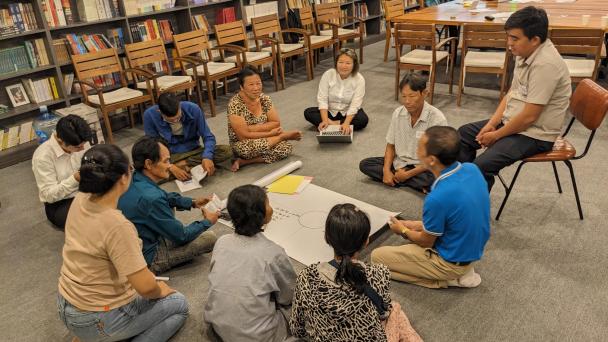Public priorities around effective governance of new devolved areas

The Centre for Deliberation’s recent citizens’ summit on the housing emergency, commissioned by Shelter, was an opportunity to reflect on how to best support those marginalised from decision-making to deliberate on policies that affect their lives.
We brought together 75 people who had experiences of housing issues and gave them the time, information, and conditions needed to discuss what policy solutions Shelter should prioritise in its general election campaign to end England’s housing emergency. This was an ‘enclave deliberation’ as it brought together people who share a particular identity or position in society. This contrasts with a ‘mini-public’ – a demographic and attitudinal cross-section that is representative of a wider population.
A key benefit of enclave deliberation is it can provide space to people who are typically marginalised from decision-making and public debate (including some in mini-publics). In this case, the deliberation gave the people that Shelter advocates on behalf of real involvement in shaping its work, by allowing them to have a say over what policy options the organisation should include in its general election campaign manifesto.
Nonetheless, this kind of involvement can be harmful if done without due care; for example, if the research feels extractive for participants, or is merely tokenistic in its attention to their views. We worked with Shelter to prevent such harms. This blog reflects on insights from this process that can be applied in other forms of deliberative research more generally.
Enclave deliberation encourages us to consider the specific participatory challenges that different groups of people can face, when features of their shared identities or circumstances can affect what it means for them to be included.
During recruitment, we worked with Shelter to understand the particular inclusion challenges that people experiencing homelessness or who were in temporary accommodation would likely face when joining discussions online or face-to-face. We developed additional, alternative routes for their participation, such as joining Zoom calls via back-up physical locations.
Increasingly, deliberative processes are entirely or at least partially run online, and there is established practice to support people to take part by providing IT equipment and training. What this project drew out however was the need to support people to have appropriate physical surroundings even when the participation occurs online.
Enclave deliberation also reminds us of the benefits to all deliberative processes when people are given time to settle into the new environment of these discussions and name and share their experiences.
The first workshop focused on giving people space to describe their housing issues, before asking them to deliberate policy options in future workshops. This meant people could reflect in the company of others with similar experiences, providing an element of comfort that might have been missing had they been asked to articulate their experiences and views among a broader cross-section of the public.
This kind of breathing room can be an important step to supporting them to take part in the process overall when people are not used to sharing views on issues that directly impact their lives. It benefits others too, as it can encourage new ideas to come forward for deliberation and contributes to a supportive atmosphere for people to further express their views within and beyond the research itself.
A defining feature of all deliberations is people’s exposure to new information. As such, this initial space to think can be just as useful in mini-publics, even when people’s own experiences may be less immediately central to the topic being discussed.
The citizens’ summit for Shelter served as a reminder to attend to the complexity of people’s lives, experiences, and views during deliberations. This is always important but is especially so when gathering people to deliberate who are often spoken about – and reductively so – rather than given a platform to speak for themselves. As Carolyne Abdullah and her colleagues remind us in a reflection on enclave deliberations, “people always bring much more to the table than the sum of their disadvantages”.
Deliberation can be incredibly valuable to changing how those most marginalised in society are viewed – even by advocates, researchers, and policymakers who feel they are supporting them. As Jane Mansbridge suggests, “rather than maintaining a focus on just trusting in the experience of those marginalised from power because of who they are, deliberation focuses our attention on publicising the reasons these people choose what they do when it comes to decisions that can respond to the experiences they’ve faced”. In doing so, deliberation – in all settings, enclave or otherwise – can give people more dignity and agency in discussions about the decisions that affect their lives.




Receive a regular update, sent directly to your inbox, with a summary of our current events, research, blogs and comment.
Subscribe